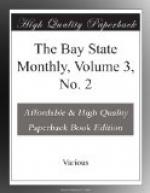Going back in this history to the period of their increasing business, we shall find that a strong religious element controlled the lives of both of these men. In the years from 1830 to 1836, which were so memorable in large accessions to the Churches of New Hampshire, the power of the gospel was manifested in Amherst, and these men with many others were persuaded to act upon their religious convictions and avow their faith in Christ. Mr. Melendy united with the Congregational Church in 1832, and Mr. David and several of his workmen followed the example in 1835; the character of all these men for integrity and steady habits had been good, but from this date a higher standard of conduct prevailed. A new direction was given to their thoughts, and the tone of the establishment was elevated by superior motives. While resident in Boston. Mr. David had been attentive to the vigorous doctrinal discussion which divided the community sixty years ago. He had listened approvingly to the preaching of Wayland and Beecher, then in the fulness of their strength. He was persuaded that the doctrines to which these divines gave such prominence were in harmony with the teachings of the New Testament; accordingly, when Mr. David accepted the Evangelical system of faith as the ground of his own hope of God’s favor, he acted intelligently. He acknowledged his dependence on the grace of God in Christ Jesus. He recognized the sacredness of the Christian calling. He became a student of the Scriptures, entered the Sabbath School as a teacher, and assumed the responsibilities of sustaining the ordinances of public and local religious worship. In 1846, he was elected deacon in the Congregational Church. He accepted the office with some reluctance, being distrustful of himself, but his counsel and service were of great value to the brotherhood. Intent on improving himself in all the qualities of Christian manhood, he was observant of the great movements of society, and deeply interested in the new and enlarged applications of Chistianity. He followed the operations of the American Board, as new fields opened to the missionaries of the Cross; keeping informed as to the changing phases of Evangelical effort in this and in foreign lands. In this particular he manifested the same accuracy which marked his knowledge of current affairs. He was familiar with the history of the United States and Great Britain,




